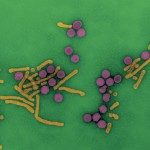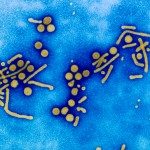Link to Pubmed [PMID] – 12466281
J. Biol. Chem. 2003 Feb;278(7):5188-94
Beta-catenin is a key mediator of the Wnt pathway, which plays a critical role in embryogenesis and oncogenesis. As a transcriptional activator, beta-catenin binds the transcription factors, T-cell factor and lymphoid enhancer factor, and regulates gene expression in response to Wnt signaling. Abnormal activation of beta-catenin has been linked to various types of cancer. In a yeast two-hybrid screen, we identified the four and a half of LIM-only protein 2 (FHL2) as a novel beta-catenin-interacting protein. Here we show specific interaction of FHL2 with beta-catenin, which requires the intact structure of FHL2 and armadillo repeats 1-9 of beta-catenin. FHL2 cooperated with beta-catenin to activate T-cell factor/lymphoid enhancer factor-dependent transcription from a synthetic reporter and the cyclin D1 and interleukin-8 promoters in kidney and colon cell lines. In contrast, coexpression of beta-catenin and FHL2 had no synergistic effect on androgen receptor-mediated transcription, whereas each of these two coactivators independently stimulated AR transcriptional activity. Thus, the ability of FHL2 to stimulate the trans-activating function of beta-catenin might be dependent on the promoter context. The detection of increased FHL2 expression in hepatoblastoma, a liver tumor harboring frequent beta-catenin mutations, suggests that FHL2 might enforce beta-catenin transactivation activity in cancer cells. These findings reveal a new function of the LIM coactivator FHL2 in transcriptional activation of Wnt-responsive genes.



